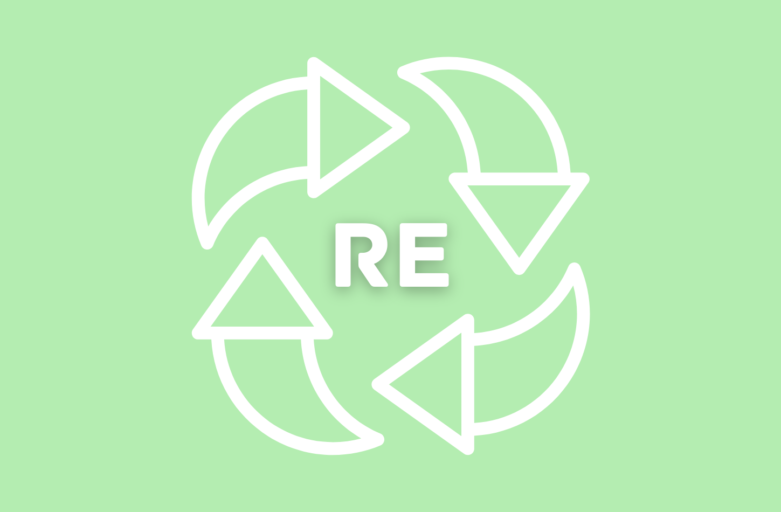Back when I was younger, since that grade school environmental art project, I’ve remembered the catchy phrase of “Reduce, Reuse, Recycle.” But that was the old view; the sustainability space has since progressed. Environmental activists have added more words to paint a fuller picture of the spectrum of sustainable actions. These are the new R’s of Sustainability: rethink, refuse, reduce, reuse, repurpose, and recycle. In the graphic below, I’ve arranged these terms in descending order, from what I see to be the most impactful to the least.
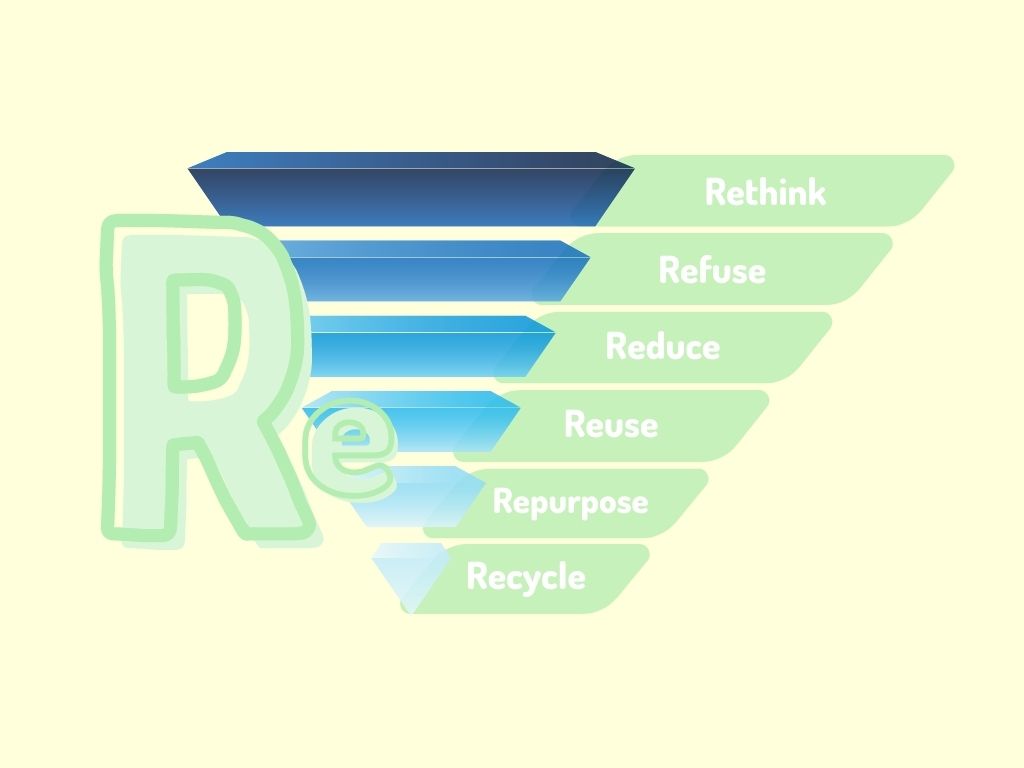
Before I go into more detail as to how each of these instructive terms can be applied, I’d like to first clarify their basis. The great thing about the original three-word maxim was what that it was pithy. It was short and sweet, making it easy to remember and disseminate across society. These new R’s however, are less concise. In actuality, it seems as if there isn’t really a consensus on what the new catchphrase should be. A simple Google search reveals differing lists from different environmental voices with their own take on a new list of six, ten, or more additional R-words. Some other examples are: refurbish, repair, renew, reclaim, reprocess, refill, replant, respect, replenish, recover, reinvent, restore, etc. When I presented my new R’s, I boiled it down to what I think is the most all-encompassing and effective messaging.
The Prefix ‘Re-‘
No one’s going to remember a laundry list of terms, which is why the original three were so effective. So rather than thinking about the meaning behind each specific word, think about the overall theme. The words have one commonality – the prefix ‘re-.’ Maybe it was just for alliteration’s sake, but I think beyond that, the prefix can actually tell us the true message of earth stewardship.
Let’s take a look a look at the etymology of ‘re-.’ From Old French and Latin, the prefix ‘re-’ means “again; back; anew; against.”1 To broaden this meaning, we come to the concepts of ‘repetition of an action,’ ‘a turning back,’ ‘a restoration to a former state,’ or ‘an opposition against.’ In other words, we can turn back the clock and restore our environment to its former glories, through acts of repetition and going against what is not repetitive. This is the bottom line. If you think about it, all of these new R-words somehow or other fit into this concept of renewing through cycles.
Mother Nature exemplifies the power of the cycle – the seasons, circadian rhythms, the orbits of planetary objects, the cycle of water from sea to sky, the cycle of death to new life. She persisted before humans and will persist beyond. Living by Her example, we, too, can live sustainably.
Well, what does this mean? It means:
- creating a circular economy
- dismantling the concept of cradle-to-grave production, and replacing it with cradle-to-cradle design
- investing in renewable energy
- discovering ways of eliminating waste (which is linear, not cyclical)
- slowing down the depletion of finite resources
Undoubtedly, these approaches are more sweeping actions that are better carried out by companies, organizations, or governments. But smaller baby steps can be derived from these ideas, especially when we consider the six R-words I presented at the beginning.
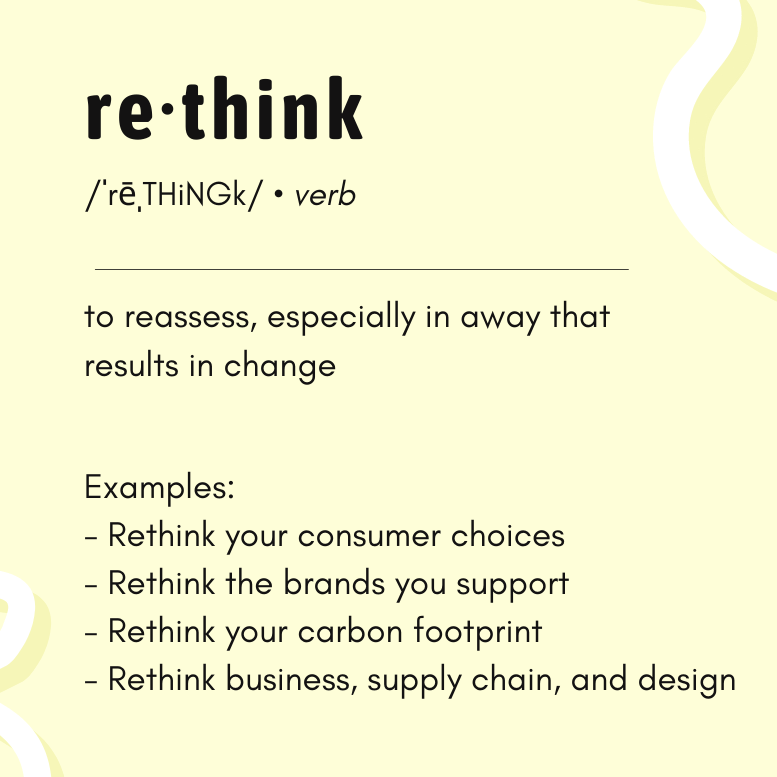
Rethink
In our capitalist society, we buy new things all the time without giving it a second thought. But understanding the environmental impact of your purchases can help change the tide. I believe that we all vote with our dollar, meaning that our purchases tell the world, the economy, and each other what we value to be important. Choosing to buy an item made from recycled material rather than virgin material is a vote for Green. Choosing public transportation over a personal vehicle is a vote for Green. Designing products that can be reused or repaired rather than ending up in a landfill is a vote for Green. We make thousands of choices all the time, and rethinking the right ones can open the potential for more sustainable living.
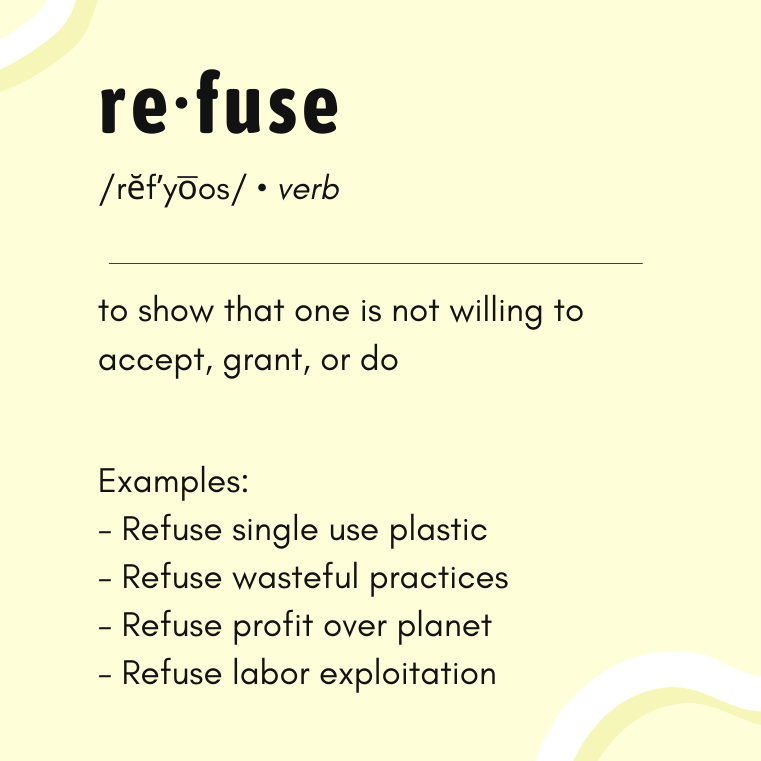
Refuse
Industrialization has created a world where wasteful systems and practices are difficult to disrupt. But we can still refuse waste in our everyday lives. Even something as simple as choosing to carpool is a way to refuse excess emissions. Choosing to consume all your leftovers is a way of refusing food waste. By avoiding single use plastic, excess, and over-consumption, or by rejecting unsustainable brands, we can withdraw our support from those corporate giants who put profit over planet. Large companies can get away with waste, pollution, and labor exploitation because they lack transparency or consequence. Refusing to support them (again, through our consumer choices) is a way to hold them accountable.
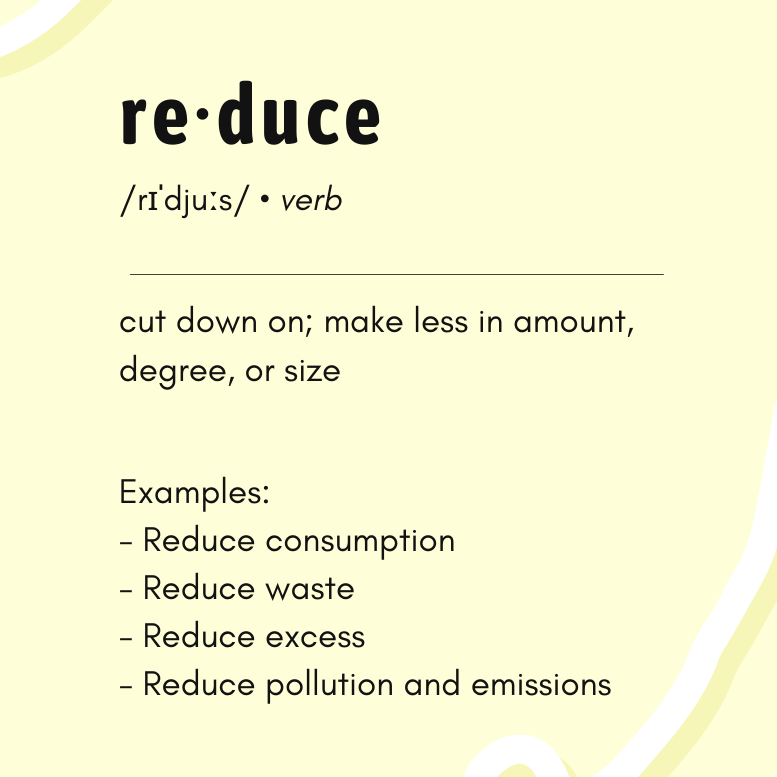
Reduce
Reduction is pretty self-explanatory. Mama Earth wants less pollution, less emissions, and less waste. Less is more. If you want something just because you saw it on Tiktok but don’t really need it, maybe let it slide. If you have recurring purchases because cheap items keep needing replacement, try investing in better quality that lasts. And please, for the love of carbs, can we stop with all the hauls! (Possible rant post to come in the future).
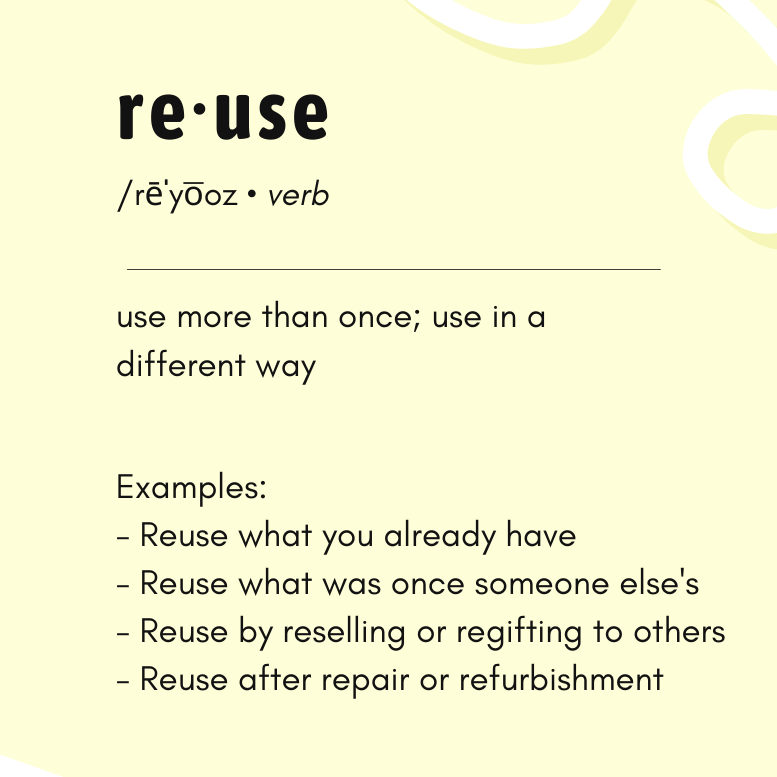
Reuse
This one boils down to simply extending the life of something that you already have in your possession. Could you mend holes in clothes, get shoes resoled (yes, cobblers still exist), or look on the internet for how to fix something? Can you repair or refurbish something so that you can use it longer or so that it can be used by someone else? Can you re-gift an item that you don’t use but would be valued by someone else? (if done thoughtfully, re-gifting doesn’t have to be tacky) Do you have the means to invest in refillable containers for soap, cleaning agents, detergent, etc?
And don’t forget about maintenance. Just as the running life of a car extends with regular maintenance, so does everything else. Cleaning and taking care of gadgets and appliances ensures you’ll get to enjoy them longer.
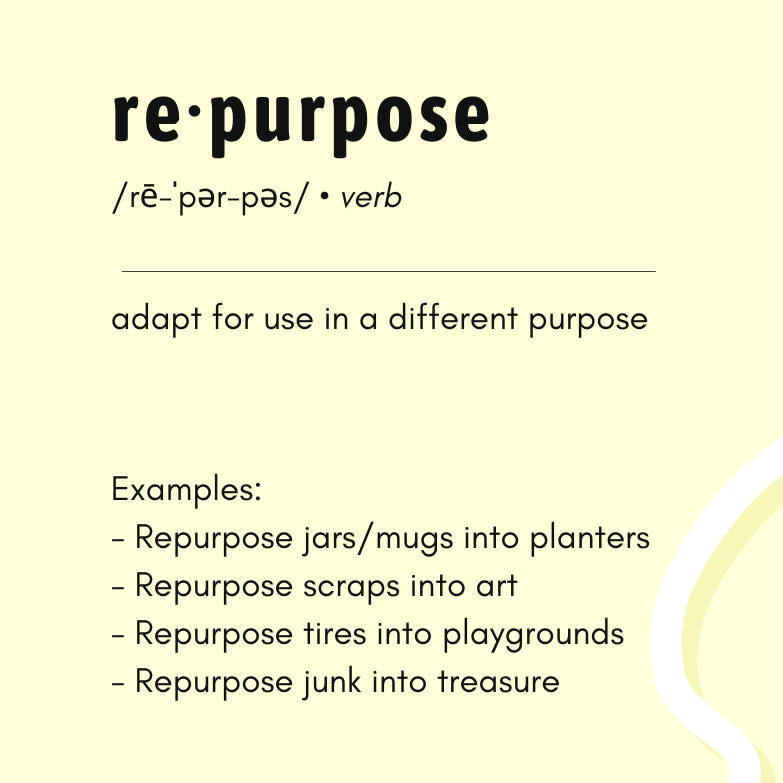
Repurpose
This is where you can get really creative. From upcycling furniture (or even non-furniture into furniture) to using car parts for art, the possibilities are endless. You’ve probably already repurposed things in your own life. I’ve used a figurine as a bookend, a pitcher as a vase, and an old camera as a piece of décor.
Many companies now have take-back programs that will collect unwanted waste and make them functional again by turning them into other things like insulation, construction materials, playground surfaces and equipment, and so on.
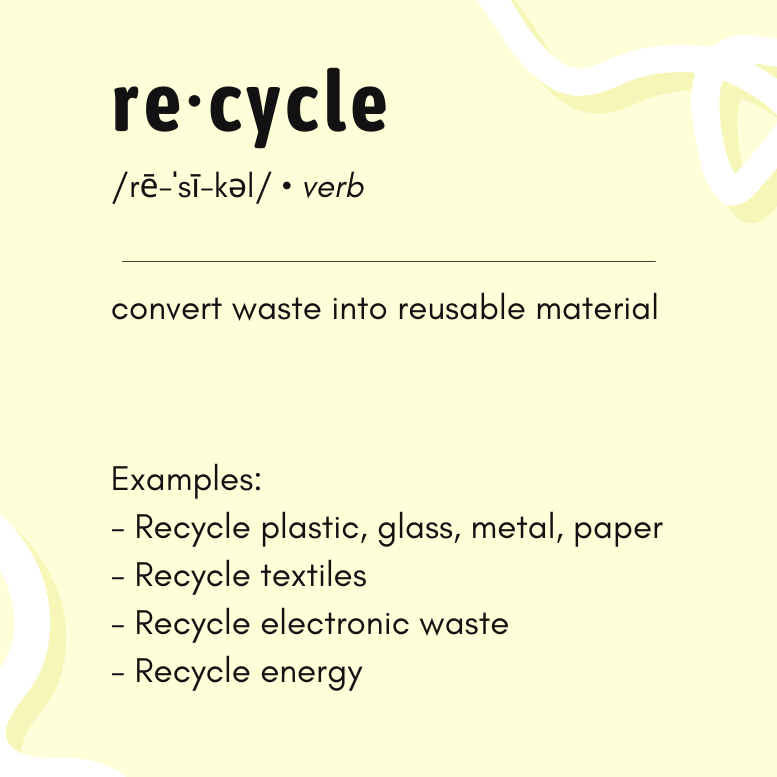
Recycle
I have mixed emotions towards recycling. It’s a terrific idea, in theory, but sadly isn’t executed well and some people do it wrong. It does little overall to curb the plastic pollution in our environment, which is why I put it last on the hierarchy. Don’t get me wrong. I’m not saying we should give up on recycling. As another means extending use and diverting from landfill, it has potential. But it’s a system that definitely needs revamping.
Sneak peak: I plan for my next post to be about the inadequacies of recycling.
There is one caveat with all this that I will indulge – only do what can align with your lifestyle. Don’t feel like you’re failing or give up hope if any of these seem unattainable to you. At the very least, give some of these ideas a test drive. If all it takes a little adjustment, then wonderful! If you’re ready to make substantial lifestyle changes, then hooray! Only you can decide what fits in that intersection between ‘good for you’ and ‘good for planet.’
I use the six R-words from above to frame my own sustainable action, but feel free to choose the ones that resonate with you. You don’t have to remember all of these sustainability R’s; you just have to remember ‘RE-.’ As long as you follow that – cyclical over linear, renewable over finite – you’ll be on the right path to living your best green.
Reference
1Harper, D. (n.d.). Etymology of re-. Online Etymology Dictionary, retrieved from https://www.etymonline.com/word/re-

